
This course on preserving food in the 16th century was just for one day, there were eight of us again including one of the young men,Chris, who was on the Bakehouse course. I was really pleased to see him again because he was so enthusiastic and willing to have a go at things. Preserving food was far more than an engaging pastime in the 16th century, it was vital to the survival of families through the hard winter months, especially the lean months before the new seasons crops in the garden became available. The main methods were salting, smoking, pickling and using sugar to make preserves. Ruth spent some time talking to us about the various methods and also about life in general during this period, then we made a start on the practical side of things. There were three things going on at once, my partner and I were pickling shallots,another group pickled beetroot and the third lot salted and brined kale leaves
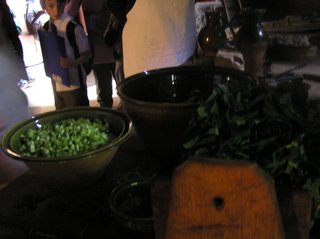 and stalks. We had to prepare our spiced vinegar, deciding which spices we would use then putting it in the fire to boil up while we peeled the shallots. No measuring jugs of course so we had to decide by eye how much vinegar we would need - we got it wrong first time and had to prepare a second lot as well! By the way, when I say we put the pot of vinegar IN the fire to boil I do mean that quite literally, it isn't a typing error! These are my finished pickled shallots.
and stalks. We had to prepare our spiced vinegar, deciding which spices we would use then putting it in the fire to boil up while we peeled the shallots. No measuring jugs of course so we had to decide by eye how much vinegar we would need - we got it wrong first time and had to prepare a second lot as well! By the way, when I say we put the pot of vinegar IN the fire to boil I do mean that quite literally, it isn't a typing error! These are my finished pickled shallots.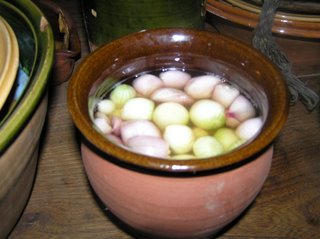
All these processes are time consuming and so by the time it was all finished it was lunch time. It was nice enough to sit outside by the lake and enjoy the sunshine and the lovely scenery. We were joined by a group of mallard anxious to assist with any leftovers!
In the afternoon we moved on to salting and drying or smoking fish, sousing a piece of pork, doing spiced beef and finally making a sweetmeat with quinces which is rather like a fruit jelly when it's finally finished.
Again we split into groups so I didn't have anything to do with the spiced beef but I gather that it is first rubbed with salt and the dry spice or spices of your choice - pepper,cinnamon and ginger were among the possibilities but it is a purely personal choice.It's then put in a bowl with a heavy weight on top to press out as much liquid as possible. While this is going on you boil the wine vinegar and then leave it to go cold. The liquid from the pressed meat is poured off, the cold vinegar poured over,weights put on again and there you are. Two of us did soused pork which is a short term method and will keep the pork for maybe two or three weeks. We prepared our spiced vinegar first(we used rosemary, thyme and ginger) and left it to go cold after it had boiled. Meantime the pork is washed in vinegar or rubbed all over with salt then put in a dish and covered and weighted down like the beef and from then on the process is the same. This is the pork just before the weights were put on.
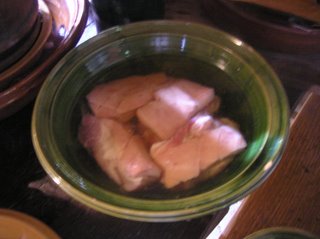
This is cod which has been rubbed with salt and laid over sticks to drain as much liquid as possible off, eventually they will be hung in a part of the kitchen with good air flow and away from the smokiness of the fire and they will dry out completely. The finished object looks highly unappetizing!
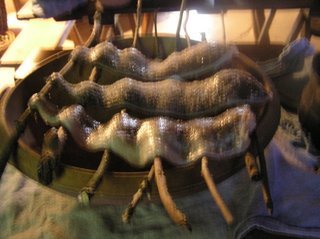
Oily fish take smoking much better than other kinds so that is what we did with the mackerel - heads were cut off and then the backbone removed before they were put in a very strong brine to soak.
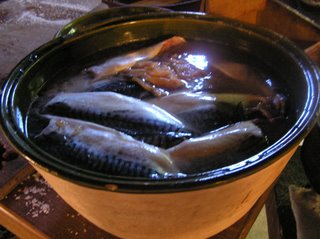
After soaking they each had a hole poked in the end and a piece of string threaded through with which they were tied onto a long stick varying the lengths so that the fish would smoke evenly without getting in each others way. Then they were strung up in the corner by the fire in the same place that bacon and hams were hung.
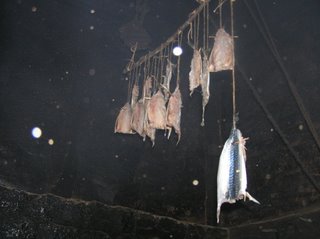
Large pieces of pork are salted every day for a week and left to drain, turning them each day. Then they are salted once a week for 6 weeks before eventually being put up in the rafters over the fire to smoke.
While all this was going on the quinces which we had peeled and prepared immediately after lunch were cooking away in their pot on the fire along with the peel and cores tied up in muslin. When they were done the pieces of fruit were taken out of the liquid and pounded to a paste in a huge iron mortar and pestle and the contents of the muslin bag discarded. The paste was returned to the liquid along with half the volume of water in sugar (still with me here I hope!).
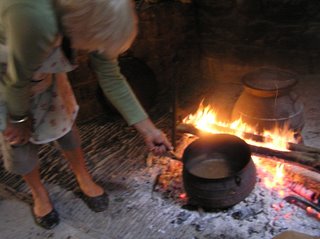 This is all done by eye of course - no measuring jugs in those days. This never actually got finished because of the time element but would have been boiled up again next day and finished by whoever was volunteering in the Tudor kitchen. When it's ready it is ladled out out onto boards and spread and left to cool.Then it is turned regularly over a period of time until sugar crystals form.Then it can be stored for up to 3 or 4 years or eaten straight away. It's a luxury item of course, only a rich household would be able to afford the sugar to make it and it would be kept for high days and holidays. As a matter of fact I've made this before on another course using damsons and the end result is very good.
This is all done by eye of course - no measuring jugs in those days. This never actually got finished because of the time element but would have been boiled up again next day and finished by whoever was volunteering in the Tudor kitchen. When it's ready it is ladled out out onto boards and spread and left to cool.Then it is turned regularly over a period of time until sugar crystals form.Then it can be stored for up to 3 or 4 years or eaten straight away. It's a luxury item of course, only a rich household would be able to afford the sugar to make it and it would be kept for high days and holidays. As a matter of fact I've made this before on another course using damsons and the end result is very good.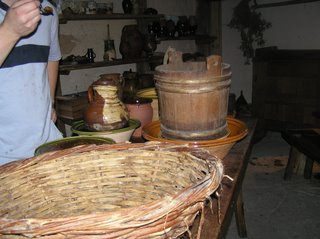
This final photograph is at the end of the day, the jug is filled with water and weighing down the soused pork, the wooden bucket (which is very heavy)is weighing down the spiced beef and the figure to the side is Chris testing the quinces to see how they taste! Very good according to him. This was the most enjoyable course I've done yet at the Weald & Downland, I really felt I'd learnt a lot that was new to me.
Sorry the photos aren't that great, as before the low light level in the kitchen doesn't help and also I seem not to have taken many this time, must have been too occupied actually doing stuff!
How nice to see more Tudor stuff : ) I really love the idea of fire cooking...
ReplyDeleteOh, they really had to work hard to put food on the table back then. I really have to admire all of you who took part in this. I'm sure it was fun but also hard work. I wish more young people could experience something like this as most of them think food comes straight from the supermarket!
ReplyDeleteRowan,
ReplyDeleteWell it's clear to me my adventuresome friend, that you've had a goodly amount of fun this summer. And good-for-you. I'm conviced that you are the type of person who finds the sunny spot wherever she goes.
Again I'm enamored of these period courses you take and actually get hands on experience doing things I've only fantasized about.
When next I visit England I'd like to avail myself of such an offering if I can find something. Until then I'll satisfy my yearnings by looking at your pictures and peruseing your prose.
I'm delighted that you and your friends (?) are game to do this. I know that it's all very hard work, and we have life so easy in today's time, but it scares me that we are losing the ability to literally take of ourselves. We all could use some of these courses.
ReplyDeleteI find this all so interesting.
ReplyDeleteWhat a different life our ancestors led. Factor in the time it took to raise the animals, grow the vegetables and fruit,then to harvest it, meanwhile all the other daily chores the needed to be done, and I'm exhausted just thinking about it.Add to this spinning,weaving, making their own clothes, plus baking and keeping a roof over their heads...how many of us, deprived of our luxuries would survive.I know I wouldn't! I almost wonder if civilization as we know it has rendered most of us helpless.
Thanks for sharing all this with us. (Your pics are a welcome addition to your documentation of what went on in your class!)
ReplyDeleteI agree with Sheila -- it makes me tired just thinking about doing all this!
I'm grateful to be able to buy fresh food whenever I want!
Wow, they sure did have to do a lot of hard work to put food on the table back then. Maybe that`s why in so many old pictures people look old and tired well beyoond their years.
ReplyDeleteReally enjoy seeing all your travels Rowan :)
tea
xo
Wow! That was very interesting!! What alot of work and I wonder if everthing tasted like vinegar? Sounds like a fun weekend!
ReplyDeleteKelli
That was a fascinating posting about the tudor food. Some of it looks very unappealing, though I suppose the taste might be fine.
ReplyDeleteIncredible! We've certainly become spoiled in our day and age. Makes one wonder about our whining when the batteries are running low on the remote control!
ReplyDelete:-D
What Fun! -- I suppose I could take a course in our equivalent -- Chuck Wagon cooking -- cooking out of the back of a chuck wagon like the cowboys did -- but somehow, it just doesn't have the same cachet -- SIGH!
ReplyDeleteI am so envious of your beautiful green garden. Our summer was so hot and dry here and we stil have water restrictions -- can only water once a week and then only either during the early morning or evening. I need to get my rear in gear and get busy in my "garden" such as it is -- My landlady doesn't care if I "potter" in the yard. Actually, as bad as it looks now, it looks 100% better than it did when I moved in on 23 Sept 2001 -- I'll have to do a blog and post some pix. Thanks for sharing your lovely GREEN garden!
What fun! It's great that you have such fun and interesting things available to you. I suppose I could take a course in chuckwagon cooking like the cowboys did -- but somehow it doesn't have the same cachet. . . SIGH!
ReplyDeleteHow lovely and GREEN your garden is!. I'm so envious. We had a terribly hot dry summer here (in the 90's F for weeks and weeks --) and we've had water restrictions -- only allowed to water once a week and only during certain hours. I'll have to do a blog and post some pix of my poor scraggly plot -- my landlady lets me "potter" as much as I want. As bad as it looks now, it looks 100% better than it did when I moved in, five years ago last month -- how time flies!
Thanks for sharing your lovely GREEN garden and what a lovely couple! I wish them many happy returns of the day!
That looks so interesting - is this a nationwide course or is it just confined to one particular area?
ReplyDeleteOld-fashioned methods of cooking always interested me - it's probably because I was taken around so many National Trust properties as a child! I also have this notion that one day history will repeat itself and we'll be reduced to living in a very primitive fashion - and I'd like to think that I'd be able to meet the challenge!
Rowan, what a wonderful place you've found with such great goings on. It's just the sort of thing I'd love to do. I love the way you've been documenting it all with words and pictures too.
ReplyDeleteI would love some help in researching the food that would have been on board the Mary Rose, preservation, preparation, rations etc. Have to produce an essay for Heritage studies, something on the Mary Rose.
ReplyDelete